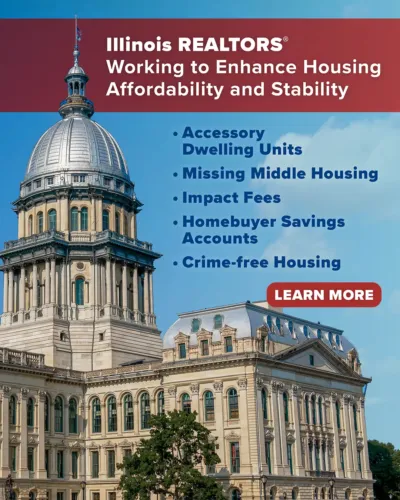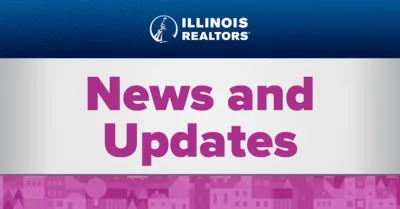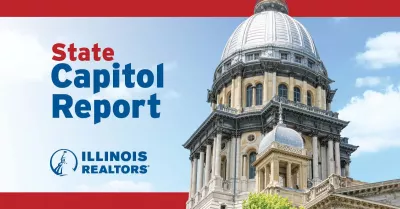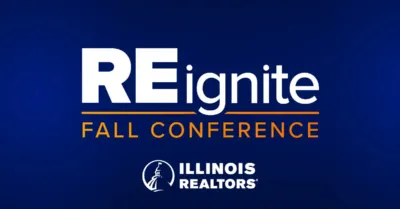New Year, New Laws
As one year closes and 2020—the year of clear vision—comes into focus, we review some of the legislation, regulations and policies that real estate practitioners should know a little bit about.
State Legislation
1. Assistance Animal Integrity Act (PA 101-0518)
- Effective Jan. 1, 2020
- Provides definitions for terms such as:
- Assistance animal
- Housing provider
- Therapeutic relationship
- If a need for an assistance animal is not readily apparent, the housing provider can seek reliable documentation to support the need.
 Provides circumstances under which a housing provider might deny a documented request for the assistance animal, such as:
Provides circumstances under which a housing provider might deny a documented request for the assistance animal, such as:
- Whether the accommodation imposes an undue financial burden on the housing provider or a fundamental alteration to the nature of the operations of the housing provider; or
- After conducting an individualized assessment there is reliable objective evidence that the specific assistance animal:
- Poses a direct threat to others that can’t be rectified or reduced;
- Causes substantial physical damage to others’ property that can’t be reduced; or
- A pattern of uncontrolled behavior that the animal’s handler has not corrected.
- Acceptable documentation is described in this Act, and there are provisions where the housing provider can request additional information about the professional relationship between the provider of the documentation and the person with the disability.
- The housing provider is allowed to balance the needs of the person seeking the assistance animal with the needs of other residents. This is not carte blanche authority to deny, but to have the housing provider try to find a balance for the disability needs of all residents.
- There is a provision protecting the housing provider from liability for injuries caused by a person’s assistance animal who is allowed as a reasonable accommodation to the person.
- Whether the accommodation imposes an undue financial burden on the housing provider or a fundamental alteration to the nature of the operations of the housing provider; or
2. Human Rights Act Amendment (PA 101-0565)
- Effective Jan. 1, 2020
- Defines “arrest record” as:
- An arrest not leading to conviction
- A juvenile record; or
- Criminal history record information ordered expunged, sealed, or impounded under Section 5.2 of the Criminal Identification Act.
- Adds arrest record to the list of things that must not be considered to refuse or limit housing (in this case). Employment is also affected by these amendments.
- Tenants or occupants of housing are still prohibited from engaging in unlawful activity on the premises.
3. Immigrant Tenant Protection Act (PA 101-0439)
- Effective Aug. 21, 2019
- Does not prohibit landlord from doing anything that is otherwise legal to do
- Does prohibit landlord from threatening with intent to harass or intimidate based on a tenant’s immigration or citizenship status
- Provides remedies
- Provides affirmative defenses for landlords
4. Workplace Transparency Act; PA 101-221
- Huge piece of legislation with many different parts
- Effective Jan. 1, 2020
- Article 1 of Workplace Transparency Act
- Deals with employment issues and agreements
- Amendments to the Illinois Human Rights Act
- Something new for almost all employers (every employer who has at least one employee) is a requirement for annual sexual harassment prevention training.
- The Illinois Department of Human Rights (IDHR) will be developing an approved program for use by employers.
- New employees must undergo training within first 90 days of onboarding.
- Existing employees must undergo training once a year.
- This includes non-employees, so independent contractors need to do annual training
- Note: Real estate licensees have recently become subject to a sexual harassment prevention training as part of their continuing education requirement under IDFPR
 .
.
- This is a different requirement and Illinois REALTORS®will push more information as it becomes available, perhaps via regulation, as to how these separate provisions will dovetail with each other.
- For now, broker licensees who need to renew before April 30, 2020 should take a sexual harassment prevention training course, for which they can also earn continuing education credit.
- Read New Illinois sexual harassment prevention training will impact real estate brokerages from the October 2019 issue of Illinois REALTOR® magazine.
5. Equal Pay Act (PA 101-0177)
- Effective Sept. 9, 2019
- This Act deals with employment issues and it generally prohibits employers from asking applicants about wage or salary history, or making this disclosure any sort of condition for employment.
- This does not apply if the salary is a matter of public record.
- A voluntary or unprompted disclosure by the applicant can’t be used as a factor in whether or how much compensation to offer the applicant.
- It is permissible to provide information relative to wages, benefits, compensation or salary offered by the employer to the applicant.
- It is okay to discuss the applicant’s expectations regarding wages.
- It is okay to require the employee whose information is being requested to give express written consent before a human resources staffer is permitted to release this type of information to anyone requesting this.
6. Cannabis Regulation and Tax Act (PA 101-27)
- Go to the October 2019 issue of Illinois REALTOR® magazine for a comprehensive article on the cannabis or recreational marijuana legislation that will become “live” on Jan. 1, 2020.
- This legislation will affect many aspects of the real estate business.
Local Ordinance
7. The Just Housing Amendment to the Cook County Human Rights Ordinance
- If you are in Cook County, you may have heard of this referred to as the Just Housing Amendment or Just Housing Ordinance (JHO). They are the same thing.
- The Cook County Human Rights Commission has adopted the JHO and is in the process of publishing rules for implementation of this amendment which will serve to assist those seeking housing to gain a “second chance” if they have a criminal history.
- Generally, housing providers will be prohibited from denying housing to an otherwise qualified applicant who has a criminal history including convictions that are older than three years.
- The Cook County Human Rights Commission seeks to implement a two-step process for housing providers where the first step will be to qualify the applicant financially and through bill payment and/or tenant history. Then, only after the initial qualification, would the housing provider inquire or consider the applicant’s criminal history.
- If the applicant has a conviction in their background, they will be given an opportunity to dispute the finding and ask that an individualized assessment be conducted by the housing provider.
- There are time requirements for notices from the housing provider to the applicant and responses from the applicant to the housing provider.
- The commission is working on rules and the current proposed implementation date appears to be Jan. 31, 2020.
- Stay tuned for more from Illinois REALTOR® on this timely topic.
About the writer: Elizabeth A. (Betsy) Urbance, General Counsel and Vice President of Legal Services has served the association’s members as General Counsel since 2018 and prior to that she was Legal Hotline Attorney since 1994. Urbance is a 1984 graduate of Western Illinois University and received her law degree from the University of Missouri School of Law in 1987. She is licensed in both Illinois and Missouri.














